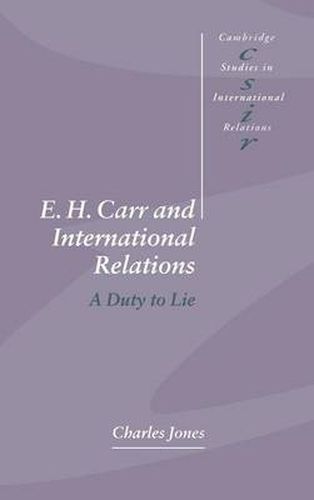Readings Newsletter
Become a Readings Member to make your shopping experience even easier.
Sign in or sign up for free!
You’re not far away from qualifying for FREE standard shipping within Australia
You’ve qualified for FREE standard shipping within Australia
The cart is loading…






E. H. Carr is widely remembered as an influential theorist of international relations. The scourge of inter-war idealists, he became the best-known Briton in a generation of predominantly American political realists. But Carr’s realism differed greatly from that of his contemporaries: a vigorous advocate of social and economic planning and friend of the Soviet Union, he stood closer to Lenin than to Morgenthau. In this book Charles Jones makes sense of Carr’s distinctive form of realism by examining his rhetoric and the reciprocal relationship between theory and policy-making in his writings. Close attention is paid to the period from 1936, when Carr left the Foreign Office, through his subsequent career as a one-man foreign ministry at Aberystwyth, the Ministry of Information, and above all The Times, culminating in the final frustration of his schemes for continued British world power in 1947.
$9.00 standard shipping within Australia
FREE standard shipping within Australia for orders over $100.00
Express & International shipping calculated at checkout
E. H. Carr is widely remembered as an influential theorist of international relations. The scourge of inter-war idealists, he became the best-known Briton in a generation of predominantly American political realists. But Carr’s realism differed greatly from that of his contemporaries: a vigorous advocate of social and economic planning and friend of the Soviet Union, he stood closer to Lenin than to Morgenthau. In this book Charles Jones makes sense of Carr’s distinctive form of realism by examining his rhetoric and the reciprocal relationship between theory and policy-making in his writings. Close attention is paid to the period from 1936, when Carr left the Foreign Office, through his subsequent career as a one-man foreign ministry at Aberystwyth, the Ministry of Information, and above all The Times, culminating in the final frustration of his schemes for continued British world power in 1947.